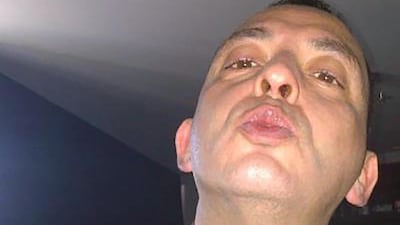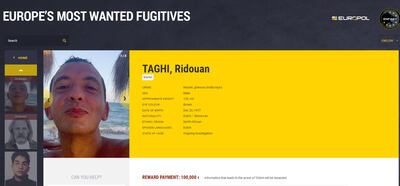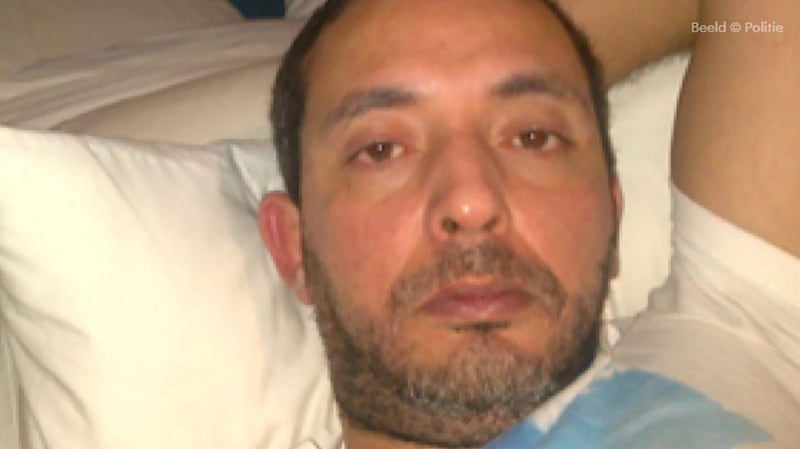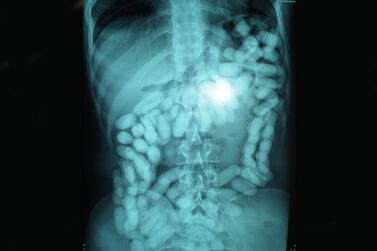After years on the run using fake identities, the Netherlands' most wanted criminal was on Monday finally tracked down to a luxury villa in Dubai.
Ridouan Taghi's reign of terror, which included accusations of 11 murders and leading a cocaine syndicate, spanned almost a decade.
Many of the killings he is suspected of being behind were said to be related to turf wars.
But it was the cavalier attitude to allegedly ordering executions that appears to have finally led to his downfall and capture.
Taghi, 41, and his associates were known for "ordering murders like they were ordering coffee", Dutch newspaper Algemeen Dagblad reported.
It is alleged Taghi ordered that the brother of Nabil B, a key prosecution witness who gave evidence against him, be murdered in March last year.
In September this year when Nabil's lawyer, Derk Wiersum, was also killed, Dutch authorities faced mounting pressure to act.
More than 100 detectives were put on the case and Taghi's inner circle was infiltrated by officers taping and retrieving vital phone messages, Dutch media reported.

Police also tracked his henchmen's movements to Dubai and discovered Taghi was living in a villa having entered the country on a fake passport.
Despite his ruthless reputation, when police raided his home and asked if he was Taghi, he simply replied "yes" and was calmly led away, Algemeen Dagblad reported.
Dutch authorities are now hoping to extradite him from the UAE to face prosecution in the Netherlands.
Morocco has also submitted a request for his extradition in connection with the murder of a judge’s son. Unlike the Netherlands, Morocco has an extradition treaty with the UAE.
Fred Westerbeke, chief prosecutor of the Dutch National Prosecutor's Office, on Tuesday said he was optimistic the Netherlands' request would take precedence.
"We assume that there must be an extradition in the direction of the Netherlands,” Mr Westerbeke said.
On Tuesday, Dutch police announced another eight raids had taken place, with six people taken into custody.
Five men and one woman, aged between 29 and 45, were arrested in Amsterdam, Huis ter Heide, Utrecht and Vianen in the central Netherlands, on suspicion of money laundering and possession of weapons and drugs on Monday night.
Taghi, who is a joint Dutch and Moroccan national, is believed to have run a gang called "the Angels of Death" and had been sought in connection with 11 murders.
Police in the Netherlands had offered a reward of €100,000 (Dh409,000) for information leading to his capture.
The breakthrough was a joint operation with the Dubai authorities, Europol and the Netherlands.
It has been alleged that Taghi is behind a third of Europe’s cocaine trade and is rumoured to have made €100 million from dealing.
On Monday night, Dubai Police said they had "arrested the head of a dangerous criminal organisation in Europe and Africa".
His capture highlighted "the influential contribution of the UAE to fighting crime globally", police said.
A spokesman for the Dubai Public Prosecutor's office said the extradition was "expected to take some time".

Dutch Chief of Police Erik Akerboom has praised the assistance from Dubai.
"Their help was essential," Mr Akerboom told Dutch newspaper De Telegraaf.
"I express a great deal of appreciation for the professional working methods of our colleagues and those in Dubai.
“The arrest is of great importance for the Netherlands. With their criminal activities, Taghi and his henchmen posed a threat to the rule of law. It is our duty as police to protect the rule of law and to remove threats."
Andy Kraag, head of criminal investigations in the Netherlands, said finding Taghi had taken significant resources.
“Catching him took a monumental effort from specialised experts across the police department,” Mr Kraag said on Monday.
"Specialists worked on the investigation day and night for over a year. These types of criminals mistakenly believe that they are untouchable.
"We want to dismantle these organisations step by step."
An international arrest warrant was issued for Taghi last year after he entered the UAE using the fake identity.
Police discovered his hideout last month but halted the raid at the last minute over fears he would flee.
“Let's assume that if we could have arrested him earlier, we would have," Mr Kraag said.
"This complex international investigation takes time. These are men with money and network and so they can buy their freedom."
Jannine van den Berg, head of the national police division in the Netherlands, said: “In today's world, building strategic co-operation is more important than ever and it is through close international co-operation that it is possible to act effectively and decisively.
"His arrest is a good example of this."
Taghi’s alleged criminal empire stretches across Europe and his gang is believed to be one of main mafia groups operating on Spain’s infamous Costa Del Sol, also called the Costa Del Crime.
Taghi has been linked to the murder of Dutch drug trafficker Hamza Ziani in Torremolinos in Spain last year. Ziani was shot four times in the head at a restaurant.
A recent book called the Costa Del Coke has exposed the drugs empire along the Spanish coast.
One of its authors, Dutch journalist Ivo Tuelings, told Olive Press, a Spanish newspaper, of the murderous rivalry between drug gangs.
“Lately Moroccans, mainly Dutch Moroccans, are taking over the cocaine business," Tuelings said. “The [Dutch] Moroccans are a new generation that doesn’t mind using extreme violence.
“However, the Dutch Moroccans are their own biggest rivals. There is a huge civil war going on in the Netherlands right now.”







